As an independent retailer, I receive product submissions daily. I say no often: In my head, in emails, in person. It’s uncomfortable, confrontational, and I would love to avoid it. But lately my relationship with no is changing. Though no can feel like a door closing, it also offers you the ability to carve your own path and to hone in on what you do best. If you let it, no can be the sharpest tool you have to help your business grow. ~ Emily of Clementine
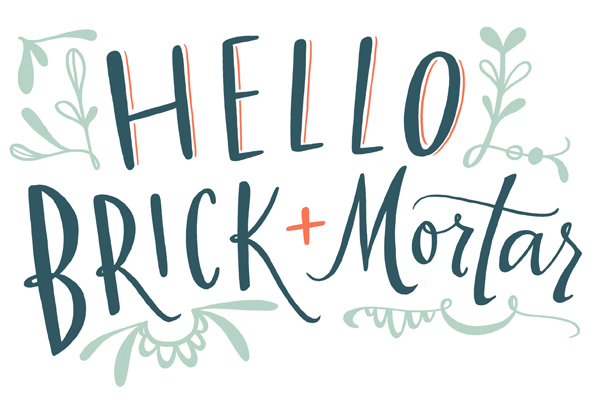
Illustration by Emily McDowell for Oh So Beautiful Paper
I’ll set the scene:  You’re a designer, I’m a small retailer. You are excited about your line. You put together a great submission. You ship or email it to me. I say no, or worse, you don’t hear from me (oof, I’m sorry, email again!). Here are the top reasons why I say no:
- Your work isn’t a fit for my shop.  Clementine is mine; I get to trust my gut as it screams yes or winces no. The yeses are fun, the nos are hard. There isn’t always a clear reason – maybe your style isn’t for me or maybe too many other shops have picked you up and it feels like you’re everywhere. These are the nos that make trade shows or your follow up emails hard: I love meeting each of you and watching your lines grow, but it can feel like the interaction rides on my yes or no. I’m working to see this moment differently. Rather than saying no with apology, I try to remember it is the unique combination of my yeses and nos that make my store mine. The same is true for your business. No is not a comment on your talent, or your future. A no from one shop might mean you’re ready for far bigger things. If you really want to grow your wholesale line, these are the nos you should be seeking out; they are the glacier that carves the path to stores and customers who will say yes.
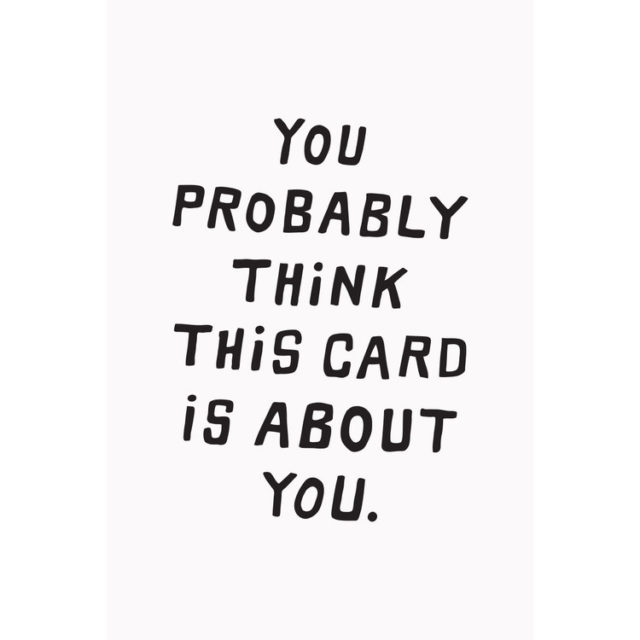
Scout’s Honor Paper reminds you: you probably think each “no” is about you, but it may not be.
- Your work doesn’t stand out/You are growing. Maybe I have too many hand lettered lines or maybe you haven’t found your voice yet. Either way, I want each line I carry to have a consistent, unique voice. I may see something really great in what you’re doing, but I know you need time to develop. If you listen closely, this isn’t a no, it’s a “call me in a few years.”
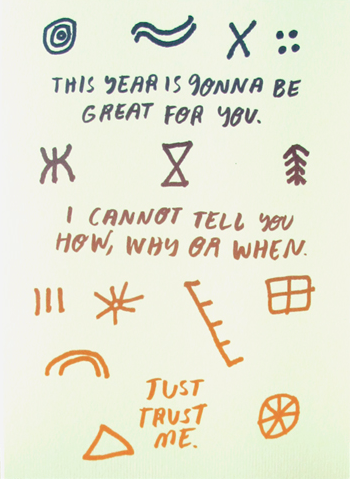
People I’ve Loved with precisely the vague encouragement I want to give to many submissions I receive.
- Your work feels too much like someone else’s. Pretty touchy subject right? We could go down the slippery slope of copyright, but instead, here’s a story: Recently, I received a submission from a new designer. One of their cards was very similar to a card I already carried. I emailed my current seller to let them know that I was concerned. Rather than being angry or defensive, they simply said yes, it did look “inspired by” theirs but “designers see each others work often and copying is not always intentional, we’ll keep an eye out to make sure it’s only a one time thing.” I loved this response. As a retailer, it’s not my job to adjudicate copyright infringement. It is my job to make sure each line I have has a place and adds something to my store. As a designer, it’s your job to be inspired and to make (and also be sure you made it first.)
- Your work needs work. A lot of people seem to be starting stationery lines. I applaud this. But hey, a lot of people seem to be starting stationery lines. Now more than ever, lines are launching with founders who lack traditional design or fine art experience. You don’t always need traditional training (but sometimes you do.) You should follow your dream, but if you want me to sell your dreams they need to be well designed, well printed + packaged, and distinctly your own.
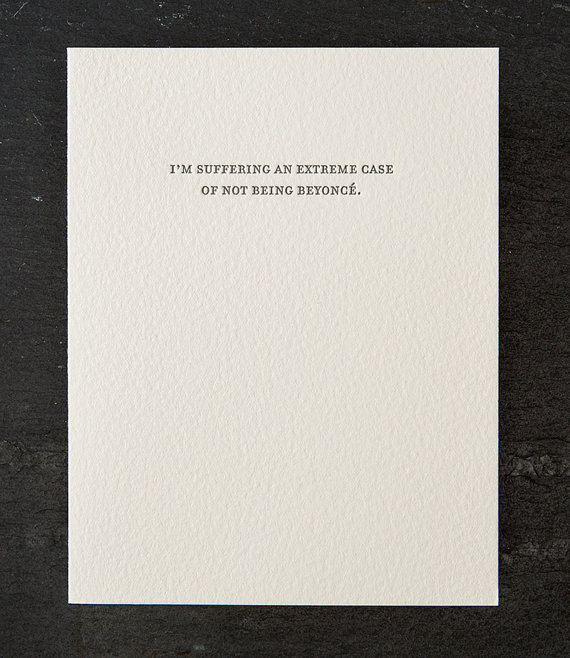
Sapling Press’s Beyonce Card: We’re all supposed to feel not like Beyonce sometimes.
- I don’t have the space/money. This is totally not about you! At last count, I had 64 stationery lines. I would love to add more, but we’re full. Sometimes submissions come in and I think: I love it, I need it, I can’t buy it now. To these submissions I always try to say: keep in touch! And I mean it.
- Your understanding of wholesale is a bit wonky. Sometimes I love a line, but the pricing or minimums are way off. This is common for lines that are new to wholesale. After all, without a mentor, how would you know what’s standard? Each industry is different. Luckily, a tactful email to a designer you admire, or google search will get you far (and I’ll do another post on this soon.)
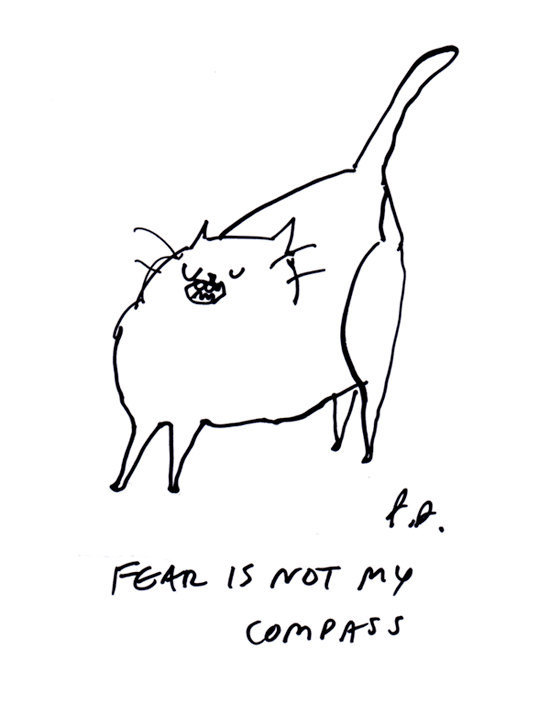
This Dancing Cat print should be your compass as you reach out to wholesale accounts.
Those are some of the reasons I say no. Now I want to try to shift your relationship with no a little more. I want you to consider inviting it in to your business. Stay with me. If you invite no into your business, you also invite more opportunities we have to hear yes. Here are a few ways I’ve seen that happen:
- “No” can help hone your line: Stationery brands may try on several styles before finding their own. This is great for figuring out what you do best. My no, in this case, means I’m waiting to figure out who you are. But if your first catalog shows several discordant styles, I may be wary to establish a relationship with you right now. Luckily, people grow, lines develop (even after you find your voice, keep finding it)! Your voice shouldn’t be static, but it should be clear: mix your gut, your inspirations, the yesses and nos to find your style. Let nos give you permission to shed your old skin, drop the cards you don’t love, prune your line to make it stronger. Reflect on your voice and delve deeper into your style and your unique voice. (Still not sure what your voice is? There are some great podcasts, blog posts and courses that can help, I’ll share my favorites soon!)
- “No” is an opportunity to ask for feedback. I often procrastinate saying no because every no is different: not now, not ever, not until you find your voice, I’m excited to see what you do next, I love what you’re doing but I can’t afford it. Based on the quantity of submissions I get, the quality of my replies has diminished. I want to tell you more, but I just don’t have time. Honestly, my dream job would involve having these conversations with emerging lines each day. I’m not suggesting retailers always have the time to reply, or have a clear answer why they said no, but if you’re willing to ask for more feedback, you might get some really valuable advice. How? Simply thank the retailer for replying and tell them you’d love to hear their thoughts on why it’s not a fit, or what you can do to grow your line. Don’t want to start with retailers? Ask friends and colleagues what they like about your line, push past “it’s all great!”
- “No” helps you find your people. No doesn’t feel good until you get some yeses. When you do, you start building your identity, your brand, and your tribe. Your first wholesale submissions should cast a wide net. They should grow more tailored as you understand the landscape. Some stores may take several submissions before you get a yes. Some will never say yes. But as your line evolves, no will become something you rely on to help spur you further and relieve you from the places you shouldn’t be.
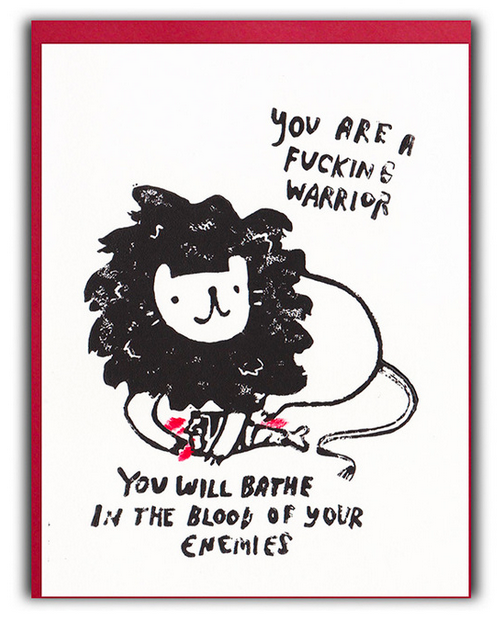
Ghost Academy’s Warrior Card ~ for the days that “no” has you down, remember….
I own Clementine, in large part because of some big nos I’ve been dealt. Yet, some days I’m still not brave enough to say no to others. This post is to remind me to embrace no too. When I avoid no, emails go unanswered, thoughtful submissions pile up, we stay stagnant. Instead let’s make a space to give and receive everything no has to offer.  I know that no feels weighty, but it doesn’t have to be a barrier. If you’re open to hearing no, you can help determine how it guides you. That’s powerful stuff.
You know? (Now I’d love to hear your stories of no)

Great post Emily! When I was starting off I was so afraid to hear no, when honestly there were a lot of times my line wasn’t ready to be pitched to the people I was pitching to. I used to be so bummed by the no’s and take no responses as even bigger no’s than no! Now I’m confidently resilient, and know my brand so much better than I did in the beginning because of the work I’ve had to do regarding the no’s. Thanks for posting! -Adam @ Life Is Funny Press
Adam, I love this attitude. Resiliency is really the goal…and also just getting to the place where you can look back and be grateful for the nos instead of being haunted by them!
Love love this post so much. So many times as a maker you feel left in the dark as to why a retailer didn’t respond to your email or if they tried your products, why they choose not to carry the products even though they express that they really love the products. Glad Emily you took the time to shed some light on some possible reasons. I was just thinking too about some of my no I have gotten and it made me realize two things 1. Trust the retailers they know their customers and 2. It helps you to narrow down what kind of stores you fit in. Awesome post.
Navine, thank you so much for these insights. I have spent so much time not replying because I have a lot to say, but I don’t know how open designers are to hearing it, so I often keep it simple, or worse, forget to reply. Honestly, this haunts me a ton and I wanted to write this post in part to explain all of the things that I’m often thinking. Thank you for your thoughts and I love that you’re not even a stationery designer. Hooray!
GURL this is so on point. Coming from an artist turned retailer it is crushing to tell someone no ESPECIALLY when I LURRRRRVE their work. I know how no feels and I hate dishing it out to people who were once in my shoes. Love, love, love. Excellent post!!
K – it still blows me away how hard the No’s are to deliver. I really appreciate your email because it made me realize that this is an issue that most retailers struggle with and it probably leads many of us to go silent, which is the worst! THANK YOU!
Thanks for sharing, Emily! At trade shows we see a lot of retailers who come, look, love, but don’t buy. If they take time to tell me they love our work but are honest about it being the wrong look or price point for their customers, I really appreciate the sentiment because it turns a rejection into simply a bad fit. It does neither of us any good if a store carries our work but can’t sell it. Thanks for sharing the retailers perspective for all of us out there who do juggle the no’s, which all help us grow into the lines we want to be.
Shelley – yeah, those interactions are hard for me too – once I express that level of interest in a line, it feels like I’ve created an unspoken contract to purchase, so it can be hard when for some reason (time, money, other lines) I don’t. The up side is that if the interest is genuine, it creates a great opportunity for follow up and a high likelihood of orders in the future.
Emily! Thank you so much for this article. All of your brick and mortar posts are so helpful. I know that personally, I can be so fearful of the ‘no’ that I deliver it to MYSELF before a retailer even gets a chance to! Then, instead of the reason being one of the perfectly good reasons you listed, my brain tells me the reason is, “because you’re not good enough.” You know? Not a productive thought process at all. I’ll keep doing my best to remember your advice and go out and gather those no’s!
Miranda, I think this is totally normal. Luckily, it’s also often totally unnecessary! My advice is find someone who you have to run those doubts by, not someone who will just brush you off, but someone who you trust to give real feedback so that you trust them when they say “this card is great” and also when they say “I don’t love that.” I recently sent a piece of writing to a friend and I really liked it, she basically said, “yeah, there’s some good stuff here, now lets start over.” I’ve loved working from her expertise to make my writing grow, and it was easy because I went into it with the attitude of enjoying the process. Let yourself enjoy the process!
Emily, Thank you so much for this great article. These are wonderful reminders to budding small businesses…or anyone. With rejection, I always try to recall the great comments from Dale Carnegie: “Develop success from failures. Discouragement and failure are two of the surest stepping stones to success.”
…which goes down better an occasional glass of wine. 🙂 -Clare
Ha Clare, yes! I would also add: Look, nos are hard, they just are and the responses I’m suggesting here are sometimes aspirational and, if nothing else, often feelings you only get to after feeling sucky about it. It’s much much easier to look back and see the good in no after something good has come of them. xo
Really great post. And yes we all need to learn to say no in a kind way.
Thank you, thank you for this wonderful post, Emily. Finding that ideal client is a hard one to do, but all of the points you go through resonate with me and I’m sure many others. Making the no’s work for me. Yes! Although I’ve had a rough start, I’m not giving up. Redefining and refocused – that’s me!
Thank you so much for this post! It’s something that has definitely resonated with me in the first year of wholesale. Like you said, I really took the Nos as an indication of how good I was at my job. But, it turns out that they also spurred me on to find all the yeses and what’s more important, to believe in what I have been creating. Every successful person we see have encountered rejections, but what sets them apart is that they keep pushing. Emily, your Nos are so important as it means you are doing your job well, and also giving us artists important insight into our own places in the market. Thank you!! x